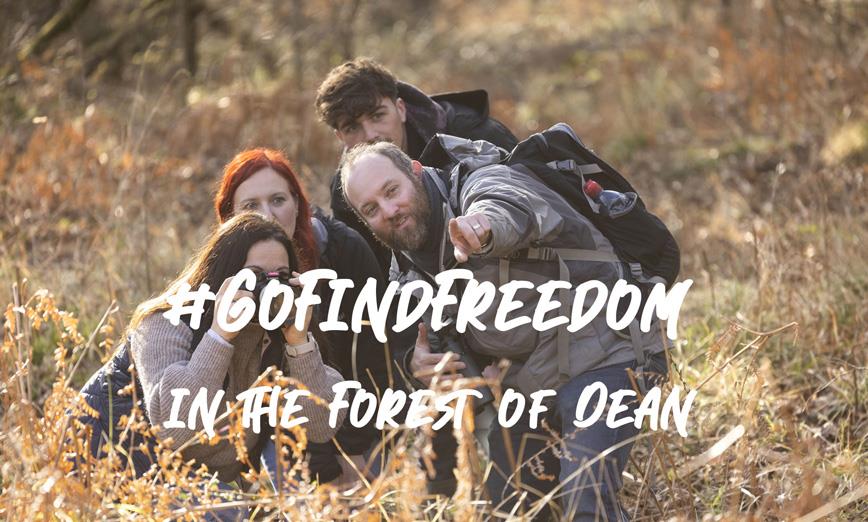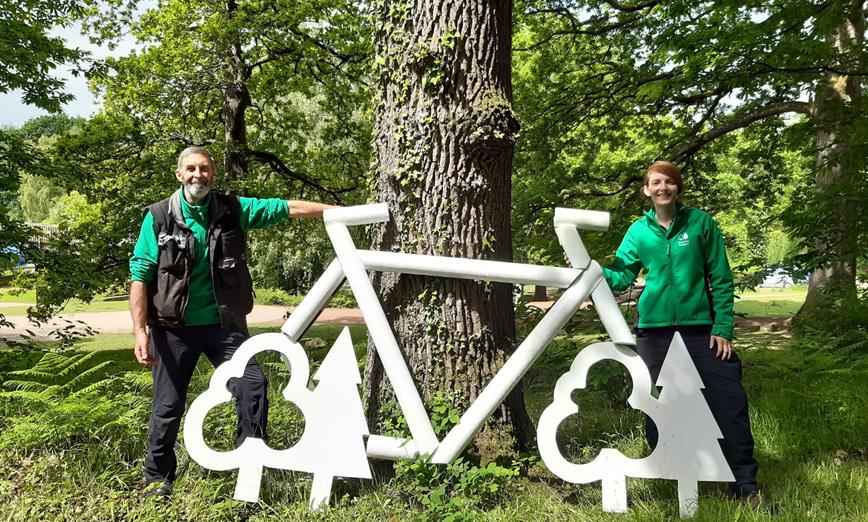- Stay
- What's On
- Things To Do
- Food & Drink
- Explore
- Inspiration
- Offers
- Weddings
- Blog
My Planner
- Stay
- What's On
- Things To Do
- Food & Drink
- Explore
- Inspiration
- Offers
- Weddings
- Blog
You are here: Explore > Famous People
The Forest of Dean and Wye Valley has a long and rich history filled with well-known people. From ancient historical figures to modern-day writers and artists, below is just a small selection of some of the well-known people who have links with the Forest of Dean and Wye Valley. There are of course many more especially going through history!
Dennis Potter (17 May 1935 - 7 June 1994) - Playwright
The playright Dennis Potter was born at Berry Hill, near Coleford in the Forest of Dean. From a family of cail miners he attended the local grammar school and spent three years at Oxford. Potter worked in broadcasting, as a journalist and stood for parliament but is best remembered for the plays he wrote in the 1980s including The Singing Detective and Pennies from Heaven. He died in 1994 aged 59.
The Dennis Potter archive, including unpublished works can be viewed at The Dean Heritage Centre.
The Dymock Poets
In the years leading up to the First World War, literary history was being made around the village of Dymock on the north-west borders of Gloucestershire. A literary community was formed which came to represent a significant development in the modern poetic tradition.
By August 1914, the poet and playwright Lascelles Abercrombie, Wilfrid Gibson, and the Americal poet Robert Frost had all taken up residence in and around the village of Dymock. Inspired by the beauty of their surroundings and encouraged by a succession of visitors, including Rupert Brooke, John Drinkwater, Edward Thomas and Eleanor Farjeon.
It was a productive time for all but this brief idyll was short lived. Within three years both Brooke and Thomas were dead, Frost had returned to North America, and Abercrombie, Drinkwater and Gibson were involved in war work. Their writings, however, continue to form an important literary legacy to this day.
Talks about the group are frequently held in Dymock, often in the spring when the wild daffodils are at their best.
Joanne (J. K.) Rowling - Author
J. K. Rowling, best known for the Harry Potter novels, lived in the village of Tutshill as a child. She attended Wyedean Comprehensive near Chepstow and there are several local people and places which inspired her writing. The Tutshill Tornados are a Quidditch team in the books, and Professor Snape was based on her old teacher, John Nettleship. In Harry Potter and the Deathly Hallows, Hermione is talking with Harry and recalls a holiday with her parents to the Forest of Dean. They then venture into the Forest and several key scenes were filmed here. Find out more about the film and its locations here.
Olly Alexander - Singer and Actor
Lead singer of Years and Years Olly grew up in Coleford in the Forest of Dean. He has mentioned the unique location having been a strong influence on him including how his first job got him interested in magic: “My first ever job in the Forest of Dean was working at this shop called Moonstones. They sold spell books and gems and crystals and incense. So my flat is basically Moonstones.” He has most recently played Richie in the BBC drama It's a Sin to great acclaim.
Frank Oz - Puppeteer
Born Richard Frank Oznowicz in Hereford in 1944, Frank Oz is a well known puppeteer and filmmaker. He began his career as a puppeteer for Jim Henson’s Muppet characters including Miss Piggy and Fozzie Bear. He is also well known for voicing the wise Yoda in the Star Wars franchise. Yoda first appeared in the 1980 film The Empire Strikes Back where Oz had a great deal of creative impact for the puppet as well as creating Yoda's trademark style of reversed grammar.
Sarah Siddons (5 July 1755 - 8 June 1831) - Actress
Sarah Siddons was born in Brecon in Wales and became the best-known tragedienne of the 18th century. As a child her family lived in Lydbrook and her childhood home is an impressive 16th century timber-framed building with an 18th century extension. It is a Grade II listed building and retains its original spiral oak staircases, and the main downstairs room still has, almost complete, its 17th century interior.
James and William Horlicks - Drinks Makers
The founders of Horlicks Malted Milk, James and William Horlicks, were born in Ruardean in the Forest of Dean.
Dick Whittington - Legendary Character
The story goes that Dick was a poor orphan country lad who, hearing that the streets of London were paved with gold, bravely made his way there to seek his fortune.
The real Dick Whittington was born at Pauntley Court in Pauntley, a small hamlet situated between Dymock and Newent. Find out more about the myths and legends surrounding the story of Dick Whittington here.
J. R. R. Tolkien (3 January 1892 - 2 September 1973) - Author
In 1929 Tolkien worked with the archaeologist Sir Mortimer Wheeler to execavate a Roman temple at Lydney Park, the same time that he was working on The Hobbitt. The temple, known as Dwarf's Hill, built upon an earlier Iron Age settlement, the hill was riddled with tunnels and open cast iron mines known as Scowles similar to those that can still be seen at Puzzlewood. Tolkien is though to have taken his inspiration for Middle Earth from the Forest of Dean environment and folklore.
Herbert Howells (1892 - 1983) - Composer
Herbert Howells, a musician and composer most famous for his church music. Howells was born in Lydney in 1892 and showed early music promise playing the organ in local churches. In 1905 he began lessons with the organist of Gloucester Cathedral alongside Ivor Novello and Ivor Gurney, more famous as a World War 1 poet. Following a stuidies at the Royal College of Music he had a long career as a composer, dying in 1983. More about Herbert Howells.
Sir Jimmy Young - Radio Presenter
The singer and radio presenter Sir Jimmy Young was born in Cinderford in 1921 and died in 2016.
Mary Howitt (1799 - 1888) - Author
An author and poet born in Coleford 1799. Mary translated many of the stories of Hans Christian Anderson into English and write the famour poem The Spider and the Fly ("'Will you walk into my parlour?' said the Spider to the Fly").
Frederick William Harvey (1888 - 1957) - Poet
F. W. Harvey was born in Hartpury on the edges of the Forest of Dean, grew up in Minsterworth and spent the last 30 years of his life in the village of Yorkley. 'Will' Harvey as he was known locally was a friend and contemporary of Ivor Gurney and Herbert Howells.
Harvey was known as ‘The Laureate of Gloucestershire’ and ‘The Forest Poet’. Harvey’s best-known poem is Ducks, which was a popular inclusion in many anthologies, but he is also respected for other works such as In Flanders, put to music by Ivor Gurney, If We Return and lighter verse such as That Catch - cricket was one of Harvey’s passions.
After the war Harvey became a solicitor specialising in defending those who could not normally afford legal representation. Harvey became a broadcaster but was most at home in his local village, commonly found in local pubs and participating in skittles, choirs and village life.
Flora Klickmann (1867 - 1958) - Editor
Flora Klickmann was an English journalist and writer; she was the editor of the Girls Own Paper but is best known for her Flower Patch series of books showing her love and concerns for nature. Flora also wrote children stories and non-fiction on many topics including gardening, cookery and needlework. She lived in Brockweir and is buried in the Moravian Church.
Winifred Foley (25 July 1914 - 21 March 2009) - Author
Winifred Foley was an author, born in Brierley. She is best known for her autobiography A Child in the Forest (1974) about her life growing up in the Forest of Dean until she became a teenager. She wrote several other titles but her forest trilogy is the titles A Child in the Forest, Back to the Forest and No Pipe Dream for Father.
Before being published, her stories which later became A Child in the Forest were made into a BBC Radio Series for Woman’s Hour in 1973. The success of Foley’s writing allowed her family to move from Huntley and live nearer to Newent, it is said that she never lost her love for the Forest.
After her death in 2009, a bench at the top of May Hill in the Forest of Dean was dedicated to her and her late husband. Read more on the Reading the Forest site here.
Bertrand Russell (1872 - 1970) - Philosopher
Bertrand Arthur William Russell was a British philosopher, logician, mathematician, historian, writer, social critic and political activist. At various points in his life he considered himself a liberal, a socialist, and a pacifist, but he also admitted that he had "never been any of these in any profound sense". He was born at Ravenscroft (now called Cleddon Hall), near Trellech, Monmouthshire into one of the most prominent aristocratic families.
He is widely held to be one of the 20th century's premier logicians. With A. N. Whitehead he wrote Principia Mathematica, an attempt to create a logical basis for mathematics. His work has had a considerable influence on logic, mathematics, set theory, linguistics, artificial intelligence, cognitive science, computer science, and philosophy.
Russell was a prominent anti-war activist; he championed anti-imperialism and went to prison for his pacifism during World War I. Later, he campaigned against Adolf Hitler, then criticised Stalinist totalitarianism, attacked the involvement of the United States in the Vietnam War, and was an outspoken proponent of nuclear disarmament. In 1950 Russell was awarded the Nobel Prize in Literature.
Geoffrey of Monmouth - Author
Geoffrey of Monmouth (c. 1100 – c. 1155) was a Welsh cleric and one of the major figures in the development of British history and the popularity of tales of King Arthur. He is best known for his chronicle Historia Regum Britanniae ("History of the Kings of Britain"), which was widely popular in its day and was credited, uncritically, well into the 16th century, being translated into various other languages from its original Latin, but which is now considered historically unreliable. Historia Regum Britanniae is now acknowledged as a literary work of national myth containing little reliable history. The earliest of Geoffrey's writings to appear was probably the Prophetiae Merlini (Prophecies of Merlin) structuring and reshaping of the Merlin and Arthur myths in later literature, a popularity that lasts to this day.
Charles Rolls
David and Robert Mushet
John Kyrle, the Man of Ross
The Foresters' Forest programme has a blue and green plaque scheme commemorating our Forest heroes. Find out more about how they are recognising local figures here.
Explore Our Highlights

- 1Stay at The Saracens Head Inn
- 2Stardust Stargazing Hut at Briery Hill Llamas
- 3Dryslade Farm Bed & Breakfast
- 4Mallards Pike Cafe
- 5Wye Adventures
- 6The Chocolate Bar
- 7Forest Holidays -Forest of Dean
- 8Humbug Barn
- 9Taurus Crafts
- 10Wye Adventures Hen & Stag Parties
- 11Leaf Creative
- 12The Dairy at Gage Farm
- 13Nuthatch Retreat
- 14Float in the Forest
- 15NoLo Cocktails
- 16Hen & Stag Activities with Way2Go Adventures
- 17Rachel Shilston - Inspiring Creativity
- 18Briery Hill Llamas
- 19Wye Valley Miniature Golf
- 20Adventure golf at Whitemead Forest Park
- 21River Wye Canoe Hire
- 22The Rookery Cottage
- 23DBC Leisure
- 24Hopewell Colliery - Working Mine and Cafe

©Visit Dean Wye 2025. All Rights Reserved.
*Visit Dean Wye is the trading name of Forest of Dean & Wye Valley Tourism Limited.









